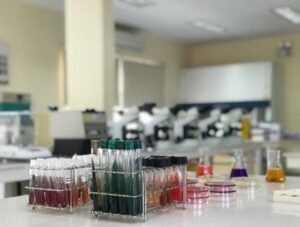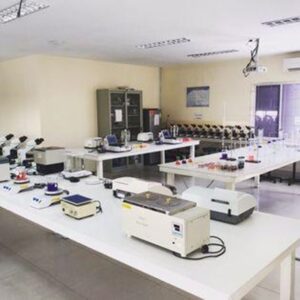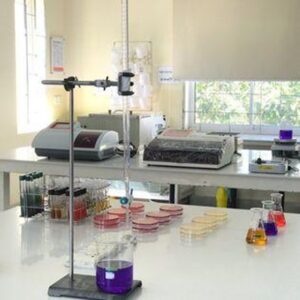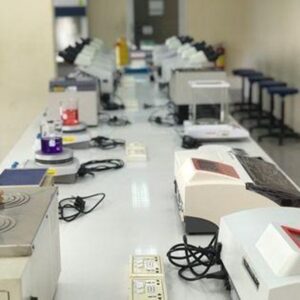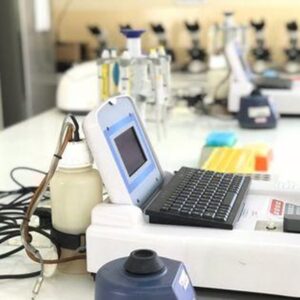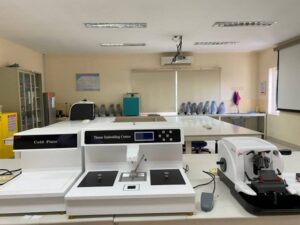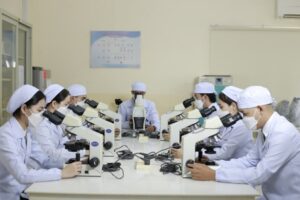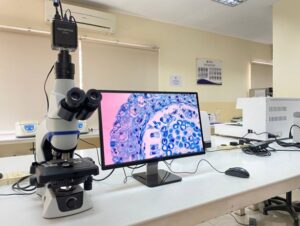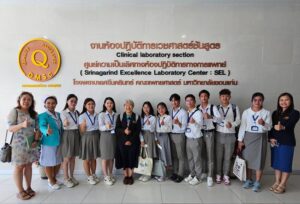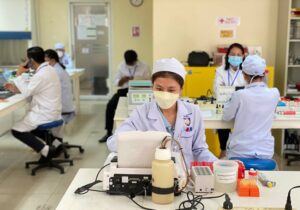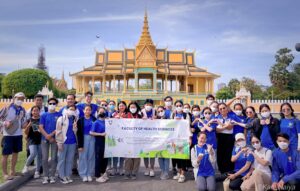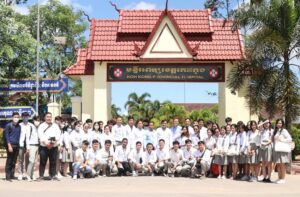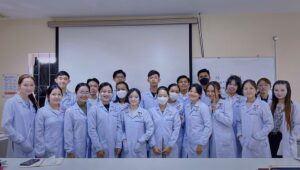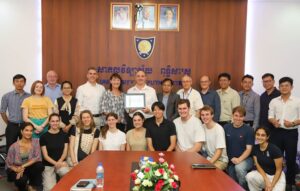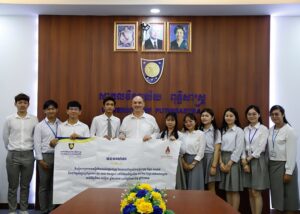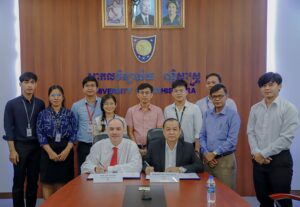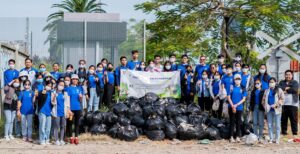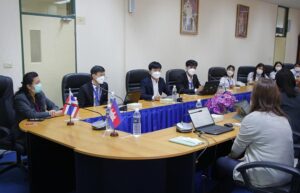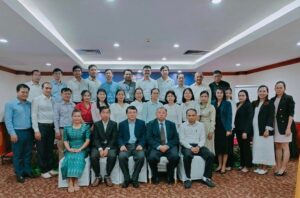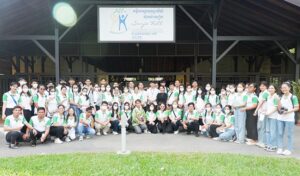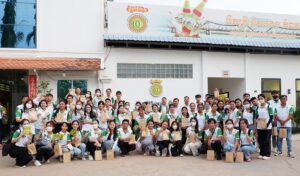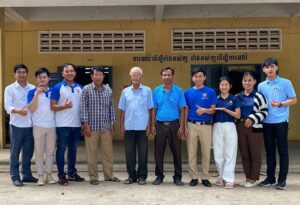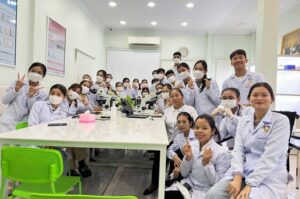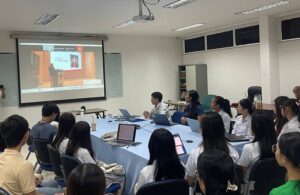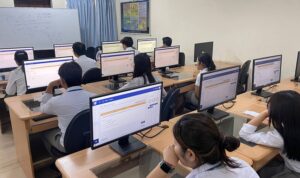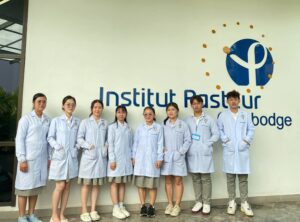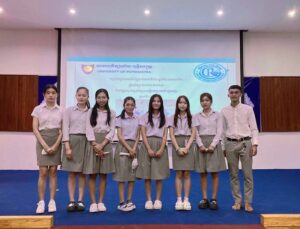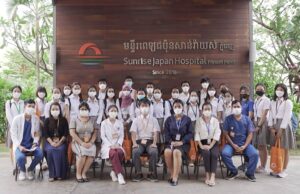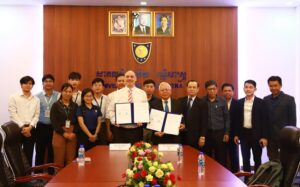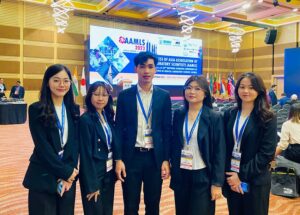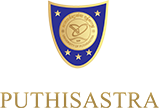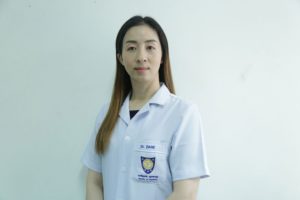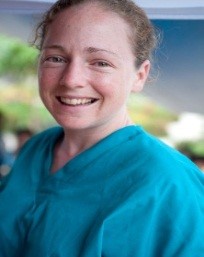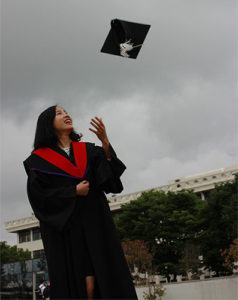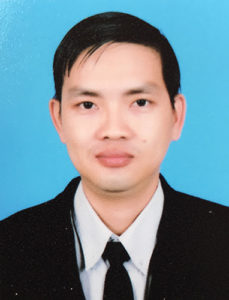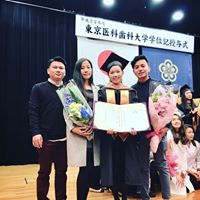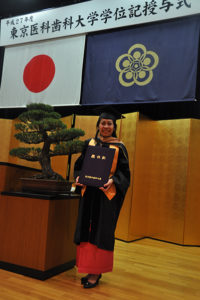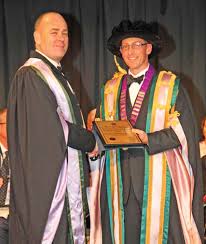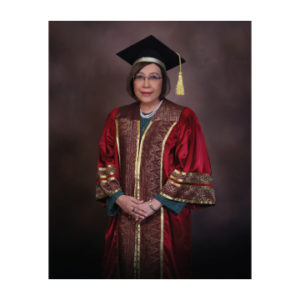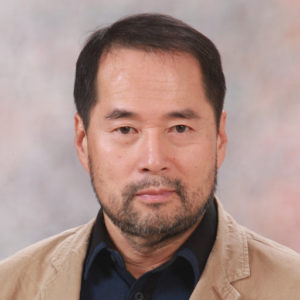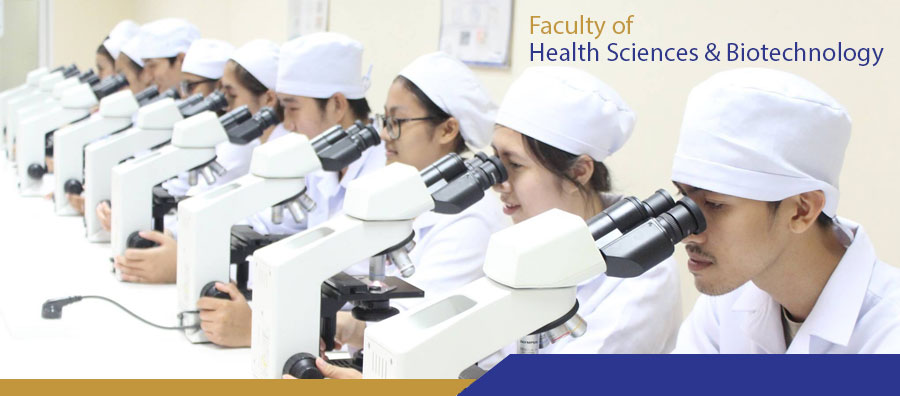
Get to Know Faculty of Health Sciences and Biotechnology
The Faculty of Health Sciences and Biotechnology (FHSB) has thrived since its establishment in 2011. It has become the leading Faculty in Cambodia that focuses on providing quality programs in Medical Laboratory, a 3 years program of Associate Degree in Medical Laboratory Technology (ADL) that is fully recognized by the Ministry of Health (MoH) in Cambodia.
The faculty has then been the First and the Only Faculty in Cambodia that MoH has trusted to officially launch the new upgrade skill program, a 2 years program of Bridging Bachelor Degree in Medical Laboratory Technology (BBL) in 2020. Though, students can continue their study for 2 additional years to get an equivalence bachelor degree of Medical Laboratory Technology nationally recognized by MoH and give the pathways for them to pursue higher degree with their preference either nationally or internationally.
It has quickly become one of the important regional powerhouses of fostering outstanding personnel for the workforce demand in laboratory sciences. FHSB now offers two undergraduate programs, 3 years associate degree and 2 years bridging bachelor degree in Medical Laboratory Technology and we are looking for more opportunities to provide our students with more varieties and options of study and pathways with the quality in Cambodia and to the international standard.
VISION
- To be a leading source of medical laboratory graduates with excellent skills and knowledge and aid the healthcare community in the correct diagnosis of diseases that will enhance the health care system of the community.
- To prepare well-educated, competent medical laboratory scientists who contribute to the provision of quality healthcare.
- To provide the educational background that will allow students to continue their education and to pursue a degree in medical laboratory science pathways.
MISSION
- The department’s mission is to give its students an education that combines a comprehensive academic study with intensive practical training in an environment that is dynamic and productive of research.
- To develop skilled medical lab technicians with a spirit of service.
- To create opportunities for students from economically backward backgrounds to gain a foothold in the healthcare industry.
- To build partnerships with local hospitals and labs and aid them in developing better diagnostic procedures.
GOALS
Through our programs, we are doing our best to:
- Offer high-quality education following scientific and ethical principles, and focused on competencies.
- Develop professional integrity and technical skills in the domain of laboratory diagnostics and biomedical research.
- Encourage evidence-based practice, lifelong learning, and commitment to training and professional development.
- Augment collaboration with healthcare facilities and communities to improve the educational value and public health benefits of health services.
- Encourage medical laboratory science and biotechnology research and innovation aimed at national and international development in Cambodia.
The programs are delivered by our excellent team of academics with outstanding background and strong passion, and this teaching team has guided and inspired over 500 quality graduates equipped with excellent theoretical knowledge and practical skills and promoting health sciences and community service.
Together, we aspire to transform attentive healthcare professionals with a passion for health to the best possible patient outcomes and adaptable healthcare systems.
EDUCATION PROGRAM
| Program and Degree | Study Period | Program Details & Outcomes |
|---|---|---|
| ASSOCIATE DEGREE IN MEDICAL LABORATORY TECHNOLOGY | 3 Years | This program is designed to provide students with a combination of theoretical classes, hands-on technical practices classes under the close supervision from lecturers and laboratory instructors in the UP’s laboratories, and also clinical clerkship and internship in many hospital laboratories and medical laboratory institutes in national level both in public and private sector throughout Cambodia. This program is designed to provide students with a combination of theoretical classes, hands-on technical practices classes under the close supervision from lecturers and laboratory instructors in the UP’s laboratories, and also clinical clerkship and internship in many hospital laboratories and medical laboratory institutes in national level both in public and private sector throughout Cambodia. To strengthen students’ technical skills and knowledge, UP has partnerships with many national and international medical laboratories, hospital laboratories, research laboratories and research institutes, and universities where students can learn and understand based on real practice in a real laboratory. The International Elective Exchange program with many well known universities overseas is an important part of this program aimed at broadening students’ intellectual skills and knowledge to the international activities and study curriculum. To see the programme details click here
|
| BRIDGING BACHELOR IN MEDICAL LABORATORY TECHNOLOGY | 2 Years (Continue program) | This is a part-time bridging program designed to offer flexibility of study time for Medical Laboratory Technology professionals for additional two years to get them a bachelor degree. This program offers students with more advanced courses in Medical Laboratory diagnostics tests in performance and analysis, enabling students to up-skill their professional degree and career advancement. Courses within the program will cover topics related to sciences, research, leadership, and management to enhance student’s professional skills, knowledge, and aptitude in the field of Medical Laboratory Technology. Students will be able to think more critically and could be given responsibility to manage the medical laboratories and deal with technical problems. Graduates from this bridging bachelor degree program will be able to pursue higher degrees in Health Science and Non Health related disciplines. To see the programme details click here
|
Faculty Team Members

Ms. Meas Sochanwattey, BSc. Biology, MSc, Biotechnology, Ph.D. (candidate) in Biotechnology
Dean, Faculty of Health Sciences and Biotechnology
Tel: (+855) 10 366 329
Email:msochanwattey@puthisastra.edu.kh

Mr. SAY Sinith, MLT, MHA
Medical Laboratory Programs Manager
Tel: (+855) 16 446 144
Email:ssinith@puthisastra.edu.kh
FACULTY RELATED
- Partnerships and International Relationships
- Human Resource
- Research
- Facilities
- Achievements
- Schedule for Classes
- Admission Criteria
- Graduation Criteria
- Future Career Pathway
- Gallery
The Faculty of Health Sciences and Biotechnology has collaborated and partnered with all the levels of hospitals and laboratories from local to international collaborations and alway looking for expanding more collaboration partners to support students to strengthen their knowledge, skills and practice while also encouraging the students in internal experience activities.
National level: faculty has assisted students to do clerkships and internships with many emerging leading laboratories in both private and public hospitals that have all service units meet the MoH requirement for the clinical clerkships and internships. Faculty has developed a well informative orientation to well prepared the students with the essential theoretical skills and technical knowledge in the first year to be ready for their clerkship year 2 and onward.
The In addition, UP has strong collaboration with international universities where students are exposed for international activities such as study exchange and visit, internship, workshops and training in many countries such as Thailand, Malaysia, Philippines, Vietnam, Japan, America, Australia, Korea,..etc.The In addition, UP has strong collaboration with international universities where students are exposed for international activities such as study exchange and visit, internship, workshops and training in many countries such as Thailand, Malaysia, Philippines, Vietnam, Japan, America, Australia, Korea,..etc. Click here.
Faculty has a regular schedule to send students to join these internal activities and is fully supported to coordinate a flexible schedule of study and arrangements for students to be able to participate and experience these activities that is well aligned with the UP mission and vision as a whole.
The Faculty of Health Sciences and Biotechnology is aiming to provide the best human capital with the best skills, performance and knowledge to the society.
Faculty have members with high qualification who have graduated from well-known universities in Cambodia and form international universities with related disciplines and have expertise in their areas and have long years of experiences in their professionalism. All the members are very energetic and have very high commitment to provide the best quality delivery to their students. While dedicating the best quality to students, faculty members also actively focus on upgrading and advancing their professional skills and knowledge by participating in many national and international trainings, workshops, seminars, or congresses offline and online in local and abroad.
Faculty also hire part-time lecturers who have high qualification and long years’ experience in teaching and lab technical instruction in a high quality laboratories and hospital so to bring the real critical case scenarios to students to develop their critical thinking and problem-solving skills.
Last but not least, all faculty members have been actively involved in many researches, surveys and surveillance and have published numbers of researches and publications in many local and international journals.
The Faculty of Health Sciences and Biotechnology is an active academic division committed to educate qualified health professionals who play a part in improving Cambodia's healthcare system. It is dedicated to matching its educational methods with national guidelines and international best practices to address the changing needs of the medical laboratory field and foster improved health outcomes for communities in Cambodia and beyond.
The faculty of Health Sciences and Biotechnology of University of Puthisastra has a wide range of research interests, focusing primarily on the following areas:
- Medical Laboratory research
- Chemistry (Analytical, organic and inorganic chemistry)
- Environmental (Soil, air and wastewater)
- Microbiology
- Biotechnology
- Cellular and Molecular biology
- Infection diseases
- Tissue culture (Plant and animal)
- Cytopathology
- Toxicology and Forensic Sciences
- Quality of Healthcare, etc,
For more information regarding to Faculty of Health Sciences and Biotechnology research please Click here
The Faculty of Health Sciences and Biotechnology is equipped with high quality machines and equipment with modern technology helping in practical instruction in the laboratory and diagnostic testing. Faculty have enough equipment, supplies and materials to support all the practical instruction classes with enough rooms for practice from basic fundamental practice courses such as microscopy examination to the advanced research course such as molecular technic and for the tissue embedding and processing in cytopathology course that is only in University of Puthisastra. Moreover, faculty continually invests in upgrading its infrastructure to ensure that students have access to diagnostic tools and resources preparing them to meet the high demand of professions.
The Faculty of Health Sciences and Biotechnology has achieved notable success in career pathways after the students graduate and research. After graduation, most students get a high paid job with their knowledge and high position. In addition, the number of research publications in the faculty is increasing year by year. Furthermore, the faculty has successfully fostered an environment that encourages students to study, to do clerkships and internships, and joining the community project. The faculty also provides students opportunities to join conferences and any competitions and innovation challenges on both national and international stages. The strong collaboration between the faculty, oversea partner-universities and industry partners has resulted in practical applications of excellence academic, research innovation and future career.
Medical Laboratory Technology programs in the Faculty of Health Sciences and Biotechnology follow the semester system which consists of 2 semesters per academic year.
Both programs are tentative to start regularly annually from April to March after the National Entrance Exam (NEE) that is organized by MoH only if notification of change.
- Year 1,2 and 3: Monday to Saturday (7:00-5:30)
- The students will have one clerkship per semester in hospital laboratories from starting in year 2 semester till year 3 semester 2
- Students will have to complete a 3-month internship after completing all course works in their final year.
- Year 1 and 2: Friday to Sunday (7:00-5:30), either on campus or online
- The students will have one Clerkship/internship from year 1 to year 2 and it will be held from Monday to Friday.
- Students will have a one year time frame to start and complete their memoir/dissertation research writing
- Any student who has successfully passed high school from any year graduation
- Successfully passed the National Entrance Exam (NEE) designate for Associate degree organized by MoH
- Apply to University of Puthisastra as the first option for “Associate Degree in Medical Laboratory Technology
- Complete in online Admission Application Form Click here
- Holders of a associate's degree in Medical Laboratory Technology or equivalent from any an accredited universities recognized by MoH and MoEYS
- Have recorded of a successfully passed the National Exit Exam (NEE) organized by MoH
- Complete in online Admission Application Form Click here
- Mandatory attached and verified all required document to admission office by the dateline (Attachment)
- Selection is through a panel meeting with the MoH and UP from the list of registration candidates.
To successfully graduated the degree they are studying students need to fulfill completion requirement for the the program as stated below:
Associate Degree in Medical Laboratory Technology- Complete all courseworks, Clerkships and Internship required by the national curriculum
- Successfully passed the Internal Exit Exam (IEE) prepared by UP to be eligible to sit in the National Exit Exam (NEE prepared by MoH
- Successfully passed the National Exit Exam (NEE) prepared by MoH
- Complete all courseworks, fieldworks, Clerkships and Internship required by the national curriculum
- Successfully passed the Internal Exit Exam (IEE) prepared by UP to be eligible to sit in the National Exit Exam (NEE prepared by MoH)
- Successfully passed the National Exit Exam (NEE) prepared by MoH
- Additionally requirement for BBL, students are required to write a memoir/dissertation research and publish a research writing as a book and store in the UP Library for their achievement as the partial fulfillment of the requirements to complete this bachelor degree program.
The graduate student from the Faculty of Health Sciences and Biotechnology either from the Associate and Bridging Bachelor Degree in Medical Laboratory Technology programs will have the technical and professional expertise to work as a senior laboratory technician in the areas of health and health diagnosis such as hematology, sero-immunology, parasitology, microbiology, molecular biology, biochemistry, toxicology and forensic, cytopathology, blood bank and transfusion and students can work and advance their career in many fields such as:
- Clinical testing laboratories
- Community diagnostic medical laboratories
- Public health laboratories
- Medical research center or Non-Government Organizations (NGOs)
- Universities and Higher Education Institutions
- Biotechnology, pharmaceutical and biomedical industries
- Educational, scientific research and technological development institutions.
- Researcher in the medical laboratory-related sciences.
- Other career opportunities include forensic science, medical laboratory supply business, private practice, and teaching.
Program Outline for Bachelor of Science Research
| Year 1 Foundation Year | Semester 1 | Credits | Semester 2 | Credits |
|---|---|---|---|---|
| Academic Skills Development | 2 | Introduction to Research Methodology | 2 | |
| Computer Applications | 2 | English Composition: Informative writing | 3 | |
| Core English I | 3 | Anatomy | 3 | |
| English Composition: Fundamentals of Writing | 3 | Embryology | 2 | |
| Khmer History and Culture | 2 | Core English II | 3 | |
| English Intensive I* | 1 | Mathematics** | 2 | |
| Biology | 2 | First Aid | 2 | |
| Biochemistry | 2 | English Intensive II* | 1 | |
| Fundamental chemistry | 3 | English Medical Terminology | 3 | |
| Total Credits per Semester: | 20 | 21 |
| Year 2 | Semester 1 | Credits | Semester 2 | Credits |
|---|---|---|---|---|
| English III | 3 | English IV | 3 | |
| Laboratory Fundamentals | 3 | Biological Systems | 3 | |
| Research Techniques in Chemistry | 3 | Math for Natural Scientists/ Data Collection & Analysis | 6 | |
| Workplace Practices and OHS | 6 | General Microbiology | 3 | |
| Work Integrated Learning (WIL) (2nd year) | 2 | |||
| Total Credits per Semester: | 15 | 17 |
| Year 3 | Semester 1 | Credits | Semester 2 | Credits | |||||
| Specified Sub-units | Forensics | Bioscience | Chemistry | Food Quality | Environment and Sustainability | ||||
| English V | ✔ | ✔ | ✔ | ✔ | ✔ | 3 | English VI | 3 | |
| Cell and Molecular Genetics | ✔ | ✔ | ✔ | ✔ | 3 | ||||
| Laboratory testing | ✔ | ✔ | 2 | ||||||
| Complex Instrumentation | ✔ | ✔ | ✔ | ✔ | ✔ | 1.5 | Method Development and Project Management | 6 | |
| Analytical Chemistry | ✔ | ✔ | ✔ | ✔ | 1.5 | ||||
| Tissue Culture | ✔ | 3 | |||||||
| Using DNA | ✔ | ✔ | ✔ | ✔ | 1.5 | Lab Quality and Registration | 3 | ||
| Biotechnology | ✔ | ✔ | ✔ | ✔ | ✔ | 1.5 | |||
| Food analysis | ✔ | ✔ | ✔ | ✔ | 1.5 | ||||
| Environmental Surveys | ✔ | 1.5 | Work Integrated Learning (WIL) 3rd Year | 3 | |||||
| Environmental Lab Technique | ✔ | ✔ | ✔ | 1.5 | |||||
| Sustainability Policy | ✔ | 3 | |||||||
| Total Credits per Semester: | 15.5 | 15 | 15.5 | 15 | 15 | 15 | |||
| Year 4 | Semester 1 | Credits | Semester 2 | Credits |
|---|---|---|---|---|
| English VII | 3 | English VIII | 3 | |
| Advanced Scientific Techniques | 3 | Research Project (Thesis) | 6 | |
| Scientific Writing | 6 | Work Integrated (WIL) 4th Year | 5 | |
| Research Protocol & Ethics | 6 | |||
| Research Proposal | 2 | |||
| Total Credits per Semester: | 20 | 14 |
Program Outline for Associate Degree in Medical Laboratory Technology
| Year 1 | Semester 1 | Credits | Semester 2 | Credits |
|---|---|---|---|---|
| Sociology | 1 | Life Science | 2 | |
| Chemistry | 2 | Biology | 2 | |
| Chemistry (TP) | 1 | Basic Computer | 1 | |
| Physics | 2 | Basic Computer (TP) | 1 | |
| Physics (TP) | 1 | Anatomy & Physiology1 | 2 | |
| Philosophy and Khmer Culture | 1 | Anatomy & Physiology2 | 2 | |
| Communication Skills | 1 | Anatomy & Physiology3 | 2 | |
| Medical Terminology (English) | 3 | Microbiology (Bacteriology) | 1 | |
| Law and Ethics in Medical Laboratory Technology Practice | 1 | Microbiology (Virology) | 2 | |
| Laboratory Materials and equipment | 2 | Microbiology (Parasitology) | 1 | |
| Laboratory Materials and equipment (TP) | 1 | Microbiology (Mycology) | 1 | |
| General English 1 | 2 | Specimen and Laboratory Safety | 1 | |
| Specimen and Laboratory Safety (TP) | 2 | |||
| General English 2 | 2 | |||
| Total Credits per Semester: | 18 | 22 |
| Year 2 | Semester 1 | Credits | Semester 2 | Credits |
|---|---|---|---|---|
| Immunology I | 3 | Blood Transfusion Science I | 2 | |
| Biochemistry I | 2 | Blood Transfusion Science I (TP) | 1 | |
| Biochemistry I (TP) | 1 | Clinical Practice Blood Transfusion Science (Clerkship) | 1 | |
| Hematology and Hemostasis I | 2 | Laboratory Techniques in Hematology and Hemostasis I | 1 | |
| Hematology and Hemostasis I (TP) | 1 | Laboratory Techniques in Hematology and Hemostasis I (TP) | 2 | |
| Lab Techniques in Microbiology I (Parasitology) | 1 | Lab Techniques in Microbiology I (Bacteriology) | 2 | |
| Lab Techniques in Microbiology I (Parasitology) (TP) | 1 | Lab Techniques in Microbiology I (Bacteriology) (TP) | 1 | |
| Statistic Science | 2 | Lab Techniques in Microbiology II (Parasitology) | 1 | |
| Laboratory Techniques in Urine and Body Fluid Analysis | 1 | Lab Techniques in Microbiology II (Parasitology) (TP) | 1 | |
| Laboratory Techniques in Urine and Body Fluid Analysis (TP) | 1 | Laboratory Techniques Biochemistry II | 2 | |
| Lab Techniques in Microbiology II (Mycology) (Clerkship) | 1 | Laboratory Techniques Biochemistry II (TP) | 1 | |
| Clinical Practice Specimen and Laboratory Safety (Clerkship) | 1 | Laboratory Techniques in Immunology I | 1 | |
| General English 3 | 2 | Laboratory Techniques in Immunology I (TP) | 2 | |
| General English 4 | 2 | |||
| Total Credits per Semester: | 19 | 20 |
| Year 3 | Semester 1 | Credits | Semester 2 | Credits |
|---|---|---|---|---|
| Blood Transfusion Science II | 2 | Immunological and Serological Techniques | 1 | |
| Blood Transfusion Science II (TP) | 2 | Immunological and Serological Techniques (TP) | 2 | |
| Pharmacology | 2 | Hematology and Hemostasis II | 2 | |
| Lab Techniques in Microbiology II (Bacteriology) | 2 | Hematology and Hemostasis II (TP) | 1 | |
| Lab Techniques in Microbiology II (Bacteriology) (TP) | 2 | Hematology and Hemostasis I and II (Clerkship) | 1 | |
| Lab Techniques in Microbiology I (Bacteriology) (Clerkship) | 1 | Parasitology | 1 | |
| Laboratory Management Generality | 1 | Parasitology (TP) | 2 | |
| Laboratory Management II | 2 | Laboratory Techniques in Biochemistry II | 1 | |
| General English 5 | 2 | Laboratory Techniques in Biochemistry II (TP) | 1 | |
| Biochemistry I and II (Clerkship) | 1 | |||
| Bacteriology I and II (Clerkship) | 1 | |||
| Parasitology (Clerkship) | 1 | |||
| Immunology-serology (Clerkship) | 1 | |||
| Advanced Laboratory Management (Clerkship) | 1 | |||
| Internship | 10 | |||
| Total Credits per Semester: | 16 | 14 |
Program Outline for Bridging Bachelor Degree in Medical Laboratory Technology
| Year 1 | Semester 1 | Credits | Semester 2 | Credits |
|---|---|---|---|---|
| Sample collection and management | 1 | Blood Transfusion | 1 | |
| Bacteriology lab Techniques (TP) | 1 | Laboratory Information System (LIS) | 1 | |
| Bacteriology lab Techniques (Clerkship) | 1 | Basic concepts of research in Medical Laboratory Sciences | 3 | |
| Biochemistry | 1 | Cellular and Molecular Biology | 2 | |
| Biochemistry (TP) | 1 | System Pathology | 2 | |
| Biostatistics | 2 | Biosafety and Biorisk Management | 1 | |
| Fundamental epidemiology for medical laboratory | 1 | Toxicology for Medical Technology | 1 | |
| Hematology and hemostasis II (Clinic) | 1 | Leadership and Management | 2 | |
| Hematology and hemostasis II (Clinic) TP | 1 | Special English for Medical Laboratory II | 2 | |
| Immunology application in Lab | 1 | |||
| Immuno-pathology | 1 | |||
| General virology and application in clinic | 1 | |||
| Special English for Medical Laboratory I | 2 | |||
| Total Credits per Semester: | 15 | 15 |
| Year 2 | Semester 1 | Credits | Semester 2 | Credits |
|---|---|---|---|---|
| Communication skill | 2 | Laboratory Quality Management System (Clerkship) | 1 | |
| Communication skill (Clerkship) | 1 | Seminar in Medical Technology (Clerkship) | 1 | |
| Cytopathology | 1 | Memoir (Degree Thesis) | 2 | |
| Cytopathology TP | 1 | |||
| Laboratory Quality Management System | 2 | |||
| Elementary Forensic Sciences | 1 | |||
| Special English for Medical Laboratory III | 2 | |||
| Internship | 10 | |||
| Total Credits per Semester: | 20 | 4 |





 Meas Sochanwattey
Meas Sochanwattey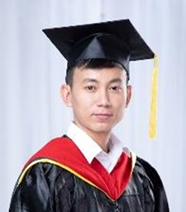 SAY Sinith
SAY Sinith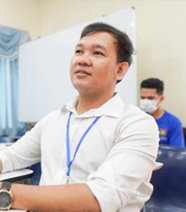 Yem Vuthy
Yem Vuthy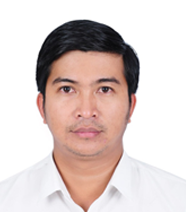 Hem
Channvatanak
Hem
Channvatanak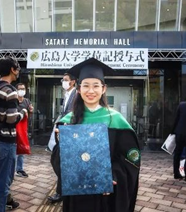 Heng Sreyly
Heng Sreyly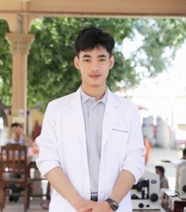 Toem Lanyra
Toem Lanyra